Environment and Social Compliance Assessment of the East African Crude Oil Pipeline Project: A Field Monitoring Report

This report presents the background, purpose of the field monitoring, methodology, key findings, conclusions, and recommendations to improve compliance. The monitoring exercise assessed the extent to which the EACOP project was complying with the requirements and provisions of relevant national laws in Uganda, international petroleum best industry practices and standards, and project-specific resettlement action plans. The monitoring also assessed the extent to which the EACOP project was adhering to the conditions outlined in the Environment and Social Impact assessment certificate. The field monitoring exercise covered key aspects of waste management, health and safety, biodiversity, restoration, compensation, livelihood enhancement, and community protection. The monitoring exercise was rapid and covered selected sites where activities and installations are planned to be done. The monitoring visit was organized in partnership with EACOP. It took place between the 14th – 17th of July 2023 covering the districts of Hoima, Kikuube, Kakumiro, Kyankwanzi, Gomba, Mubende, Lwengo, Ssembabule, Rakai, and Kyotera. During the exercise, the CSCO monitoring team was able to observe and appreciate the developments on the project sites. The team took note of concerns about the requirements of the laws, policies, and plans, and participated in the CSCO reflection meeting that synthesized the observations into a CSCO report. View PDF
The Social and Environmental Compliance Assessment for Tilenga Oil Project: A Civil Society Field Monitoring Report
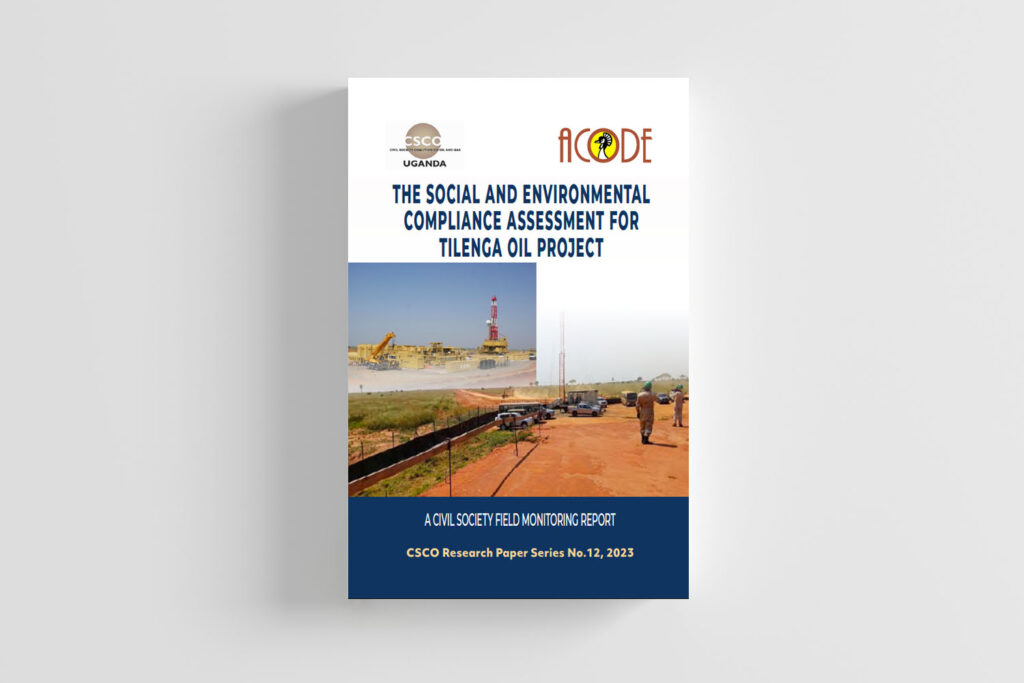
The development of oil resources in Uganda has transited from exploration to development. This has triggered development of infrastructure projects that will facilitate production and transportation. Some of such infrastructures include the East Africa Crude Oil Pipeline (EACOP), Central processing facilities, oil roads, the airport, and feeder pipelines among others. The development of these infrastructure projects has social, environmental and economic implications. Sustainable development of the oil and gas sector calls for strict adherence and compliance to not only international best industry practices, but also national laws and policy guidelines. Ensuring compliance calls for a concerted effort between project developers, regulators, project host communities and third-party monitors. Over the years, CSCO has collaborated with the oil companies, the Petroleum Authority of Uganda (PAU), Ministry of Energy and Mineral Development (MEMD), National Environment Management Authority and other stakeholders to monitor environmental and social compliance in the oil and gas projects. This report therefore, presents the findings of the CSO monitoring exercise conducted in July 2023, focusing on infrastructure developments in the Tilenga Oil Project Area. The report also provides suggestions for areas that require improvement. View PDF
Gaps in Revenue Generation, Transparency, and Management in Uganda’s Extractives Sector
Published: 2023
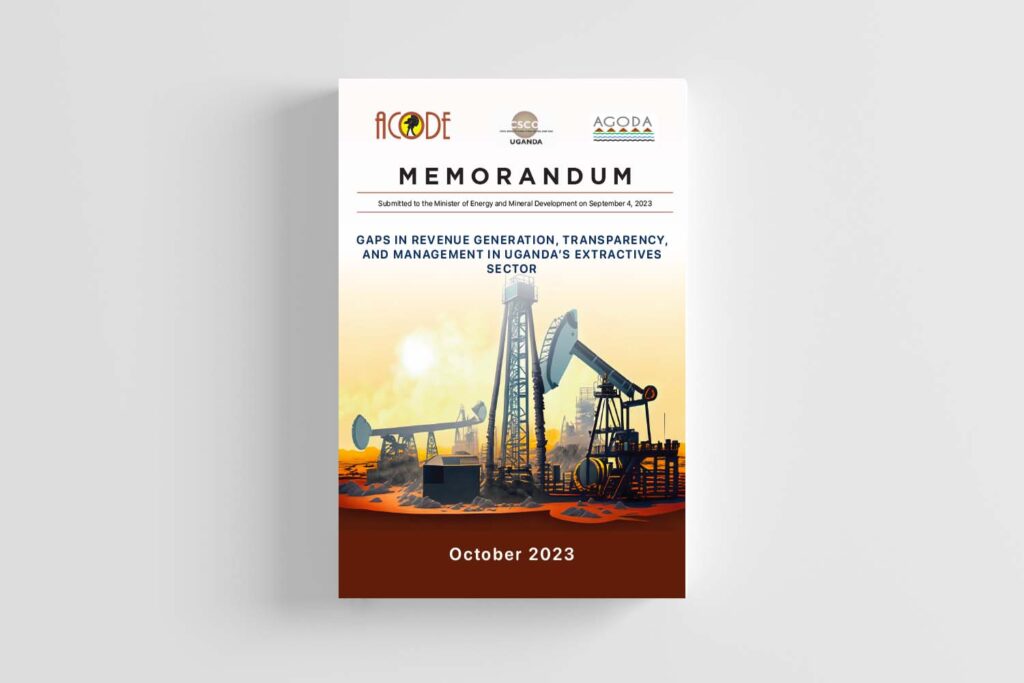
This memorandum was presented to the Honourable Minister of Energy and Mineral Development (MEMD) by the Advocates Coalition for Development and Environment (ACODE), the Civil Society Coalition on Oil and Gas (CSCO), and the Albertine Graben Oil & Gas Districts Association (AGODA). The memorandum seeks to highlight the gaps in revenue generation, allocation, and management and contribute to the requisite policy and legal reforms within the extractives sector. This is primarily aimed at improving transparency, accountability, management, and equitable sharing of extractive revenue between the national and sub-national governments. ACODE, CSCO, and AGODA identified a number of gaps that undermine transparency, equity, and accountability in extractive revenue mobilization. These gaps and recommendations have been enumerated in this memorandum. View PDF
An Audit of the Approved Environmental and Social Impact Assessments for Tilenga, Kingfisher, and the East African Crude Oil Pipeline Projects
Published: 2021
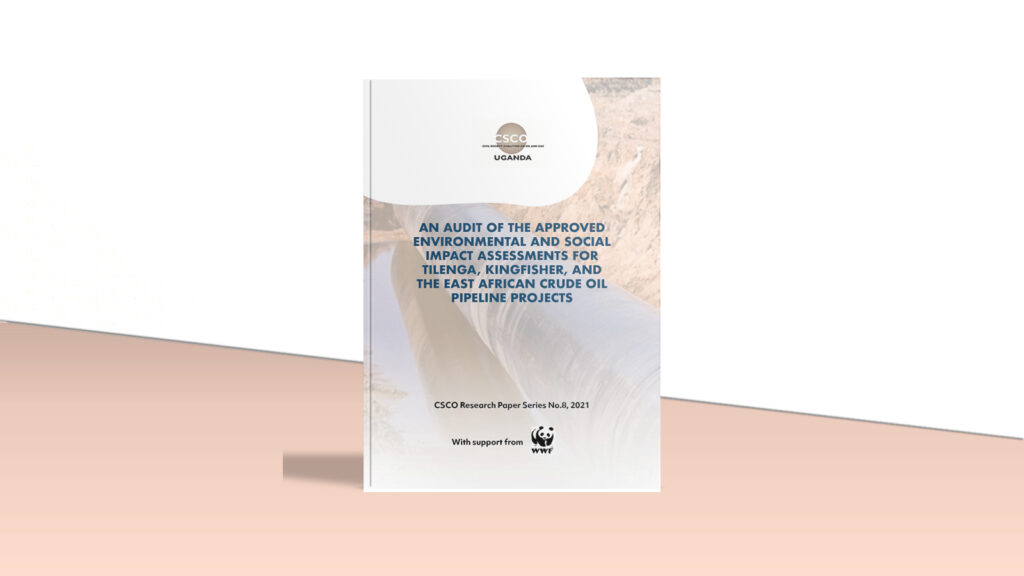
This report presents findings from a review of the approved oil and gas projects Environmental and Social Impact Assessments (ESIAs) to establish the extent to which comments from CSCO were addressed and recommendations integrated. The ESIAs considered for this audit included the Tilenga, the EACOP, and Kingfisher ESIAs. The review/audit aimed at identifying comments and recommendations raised during public hearings that were addressed or incorporated into the approved ESIAs. The inclusion was done in order to evaluate the contribution of CSCO to the ESIA process. View PDF
Gender Integration in the Petroleum Development Process in Uganda
Published: 2021
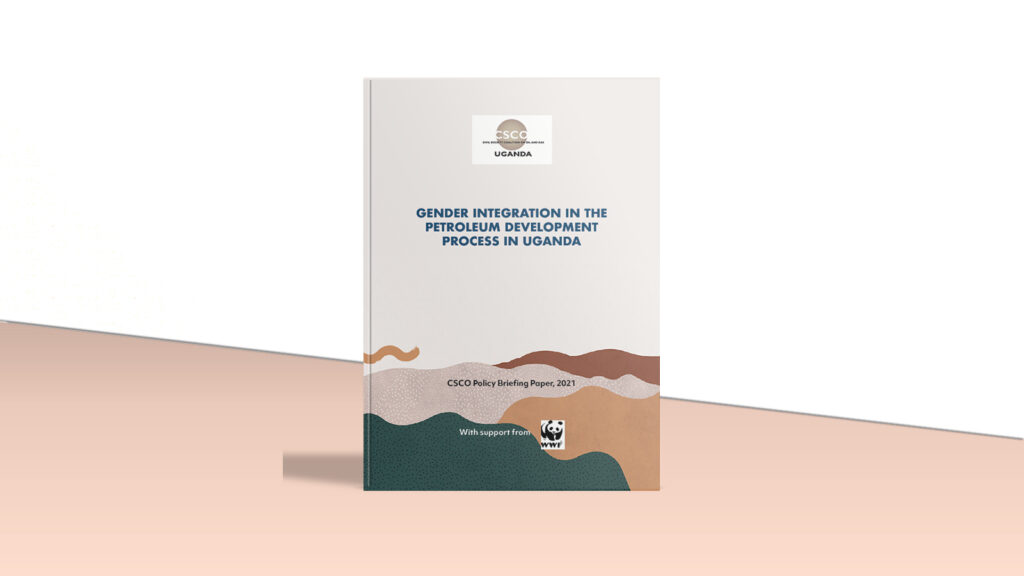
This brief points out the critical areas and actions that require the attention of various actors in order to enhance gender inclusion. While the country is excited about these developments and expects the first oil in 2025, there are a number of areas that need attention to ensure inclusive sector development. One of such areas is gender inclusion. In many oil and gas producing countries, the sector is male gender dominated which undermines gender equality and sustainable development. In order to move from this status quo and to avoid the oil sector in Uganda following suit, there is a need to identify the required actions and responsible parties that can bring about the desired changes. View PDF
Illicit Financial Flows Risk Factors in Uganda’s Oil and Gas Sector
Published: 2021
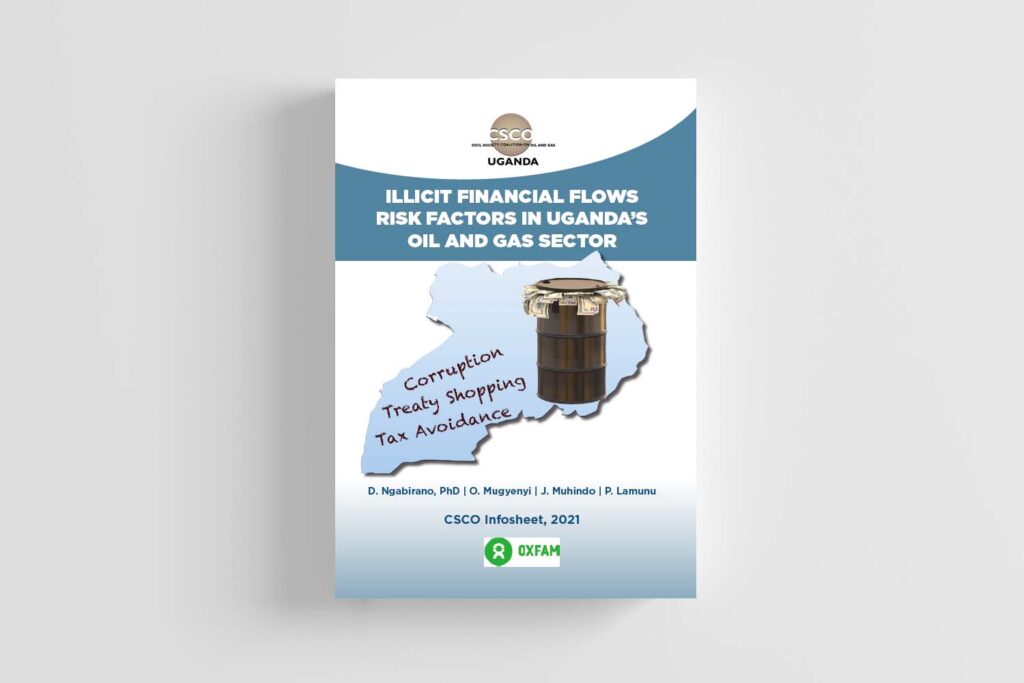
Illicit Financial Flows (IFFs) are becoming a real challenge to resource mobilisation for financing development in Uganda and Africa at large. IFFs refers to movement of money and value from one country to another that is illegitimately earned, transferred, and/or utilised (Global Financial Integrity, 2018). Africa is estimated to be losing USD 50bn in illicit financial flows every year (Economic Commission for Africa, 2015). Uganda alone is estimated to be losing UGX2trillion per year and it is feared that the situation could get worse with the commencement of commercial oil production. View PDF
ASSESSMENT OF ENVIRONMENTAL AND SOCIOECONOMIC IMPACT OF KIBIRO SPILL: A reflection on spill management and compliance with the legislative frameworks in Uganda
Published: 2020
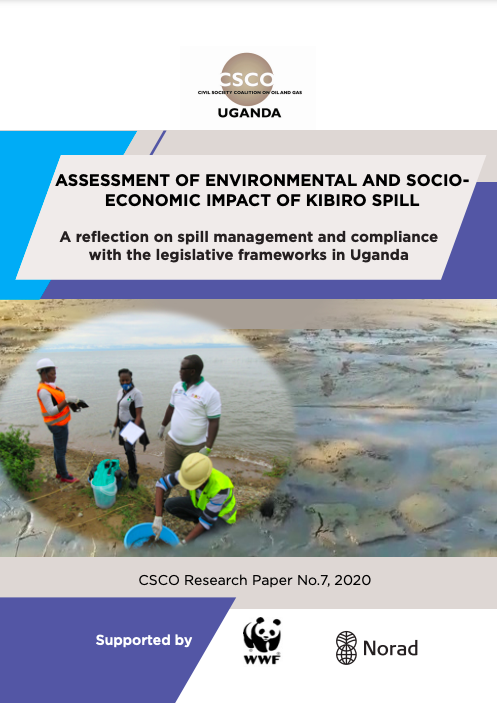
The Geothermal spill that occurred on the night of 29th March 2020 in Kibiro community, Kigorobya sub-county (Hoima district) raised concerns ranging from readiness of government of Uganda to respond to oil spills; – to the delays and laxity exhibited by concerned authorities in undertaking clean-up and remedial exercises of the affected area. The other major concern was whether the spilled material contained elements of petroleum hydrocarbons and heavy metals in excess of allowable national and ‘world average’ thresholds in water and surface soils. Thus, the Civil Society Coalition for Oil and gas in Uganda (CSCO) with support from the Norwegian Agency for Development Cooperation (Norad) through a project implemented by World Wide Fund for Nature Uganda Country Office (WWF-UCO) and CSCO, sought to undertake a comprehensive study that aimed at assessing the level of concentration of total petroleum hydrocarbons (TPH) and heavy metals in the spilled material, as well as documenting community members’ perspectives regarding the impact of the spill on their socio-economic livelihoods. This study was conducted with the hope that it could be useful in providing baseline data that will help in determining the level of remediation of spill contaminated sites in Kibiro community. View PDF
ILLICIT FINANCIAL FLOWS RISK FACTORS I N UGANDA’S OIL AND GAS SECTOR: A CALL FOR ACTION
Published: 2020

Illicit Financial Flows (IFFs) are becoming a real challenge to resource mobilisation for financing development in Uganda and Africa at large. IFFs refers to movement of money and value from one country to another that is illegitimately earned, transferred, and/or utilised. Africa is estimated to be losing USD 50bn in illicit financial flows every year. Uganda alone is estimated to be losing UGX2trillion per year and it is feared that the situation could get worse with the commencement of commercial oil production. View PDF
Safeguarding people & nature in the East Africa crude oil pipeline project: A preliminary environmental and socio-economic threat analysis
Published: 2017

The Eastern Africa region is rife with oil and gas resources and new discoveries continue to be documented and reported across the region. Several oil and gas development infrastructure projects are being planned across the region with significant potential to transform the region’s landscape and biological diversity. Of major concern to conservation organizations operating in the region are the potential negative ecological impacts these oil and gas development are likely to have on the region’s landscapes, most of which are high value conservation areas with rich and unique biodiversity. One such proposed infrastructure development is the 1,445km long Hoima-Tanga pipeline that is being proposed to transport crude oil from the oil fields in Hoima, Western Uganda to the Coastal Town of Tanga in Tanzania. View PDF
